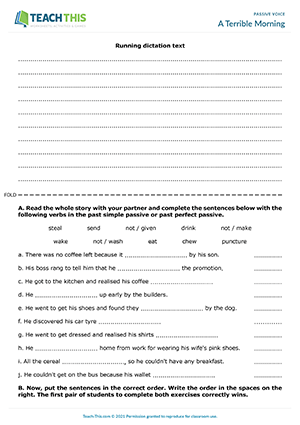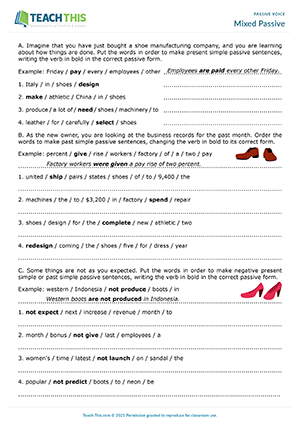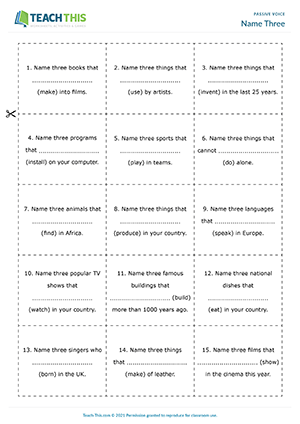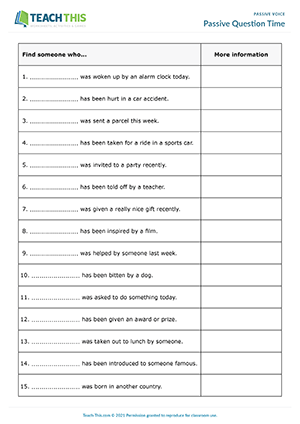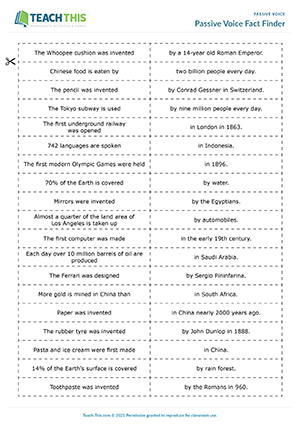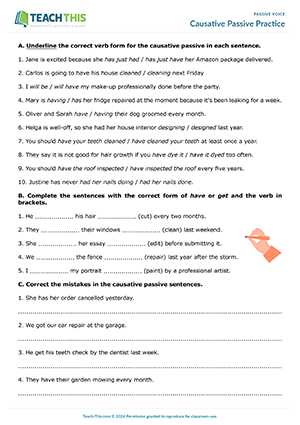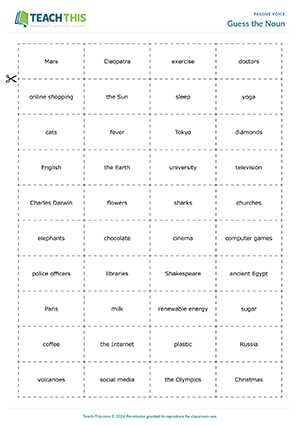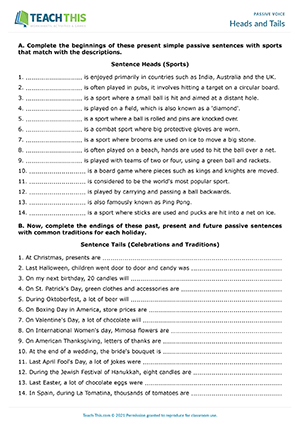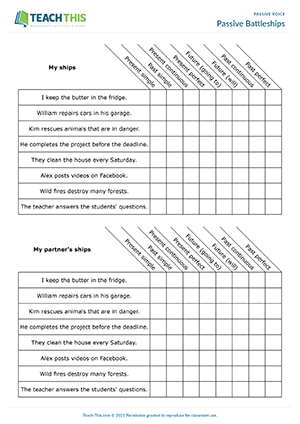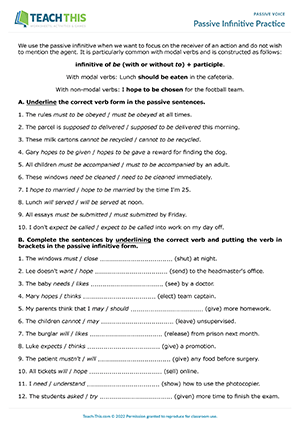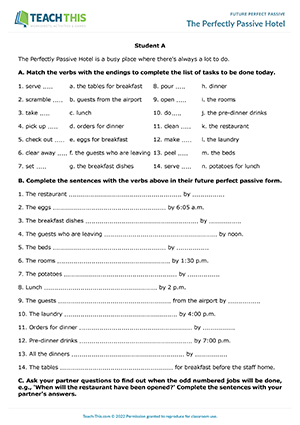In this passive voice running dictation activity, students race to dictate a story and then use it to complete and order sentences in the past simple passive or past perfect passive. One student is the reader and the other is the writer. The reader runs to Text A on the wall outside the classroom, reads the first part of the story, tries to remember as much as they can, runs back and dictates the text to their partner who writes it down. This continues until Text A has been fully dictated. Students then swap roles for Text B and the process is repeated. When the story has been completed, students read it with their partner and complete sentences on their worksheet with verbs in the past simple passive or past perfect passive. After that, students put the sentences in the correct order. The first pair of students to complete both exercises correctly wins.
In this productive shoe-themed passive voice worksheet, students practice the affirmative, negative and interrogative forms of the present, past and future simple passive. Students start by putting words in order to make present simple passive sentences, writing the verb in the correct passive voice form. Next, students order words to make past simple passive sentences. Students then put words in the correct order to make negative present simple or past simple passive sentences. After that, students choose one word or phrase from each column and make future simple passive sentences. Students then write passive questions for a set of answers. Finally, students make their own sentences using the passive voice.
In this free passive voice game, students practice making 'Name three' questions in the past and present passive. In groups, students take turns picking up a card and making a 'Name three' question by completing the gap with the past or present passive form of the verb in brackets. The student then reads the question to the group, e.g. 'Name three books that were made into films.' The group members then race to answer by naming three things belonging to the category. The first student to do this successfully keeps the card. The student with the most cards at the end of the game wins.
In this passive voice Find Someone Who activity, students ask and answer questions in the present perfect passive and past simple passive. In pairs, students prepare a yes/no question for each passive statement on their worksheet, e.g. 'Were you woken up by an alarm clock today?' Students then stand up and ask their questions to other students in the class. When a classmate answers 'yes' to a question, the student writes that person's name at the beginning of the sentence and asks a follow-up question to find out more information, e.g. 'What time were you woken up?', noting down the answer. Afterwards, students report their findings to the class using the present perfect and past simple passive, e.g. 'Paul was woken up by an alarm clock today. He was woken up at 7 o'clock.'
In these two engaging passive voice games, students identify past and present passive sentences about facts and inventions. To begin, groups race to identify past and present passive sentences about facts and inventions by correctly matching two parts of a sentence together. The first group to match all the sentence halves correctly wins. After the answers have been checked, students spread out the sentence beginnings and endings face-down in two sets. Students then take turns turning over one card from each set. If the two cards match to make a sentence about a fact or invention, the student reads the passive sentence aloud, keeps the two cards, and has another turn. If the two cards don't match, the student tries to make a grammatically correct passive statement with the beginning of the sentence, e.g. 'The population of the Earth is thought to enjoy eating chocolate.' The sentences do not have to be factually accurate. The student then turns the two cards back over, and it's the next person's turn to play. The student with the most cards at the end of the game wins.
Here is a detailed causative passive worksheet to help students practice combining causative verbs with the passive voice. First, students underline the correct verb form for the causative passive in each sentence. Students then complete sentences with the correct form of have or get and the verb in brackets. Next, students identify and correct errors in causative passive sentences. After that, students rewrite sentences, changing them from the active voice to the causative passive following the structure to have + something + participle. Next, students use prompts to write affirmative or negative sentences that are true for them using the causative passive. Finally, in small groups, students discuss questions using the causative passive in their responses.
In this engaging passive voice game, students use it + passive forms of reporting verbs to describe beliefs and opinions regarding nouns, which other students try to guess. In groups, students take turns picking up a card and giving three clues that describe the noun on the card using the structure it + passive forms of reporting verbs that are on the board, e.g. 'It is expected that humans will live here in the future.' The first student to guess the noun wins and keeps the card, e.g. Mars. If no one guesses the noun after the three clues, the student giving the clues wins and keeps the card. The student with the most cards at the end of the game wins.
This imaginative passive voice game can be used to help students practice the past, present and future passive. Teams begin by completing the beginnings of present simple passive sentences with appropriate sports. When a time limit has been reached, teams swap their worksheet with another team for marking. Teams score one point for each correct answer. Then, the teams repeat the process with sentence tails. Sentence tails are passive sentences in the past, present and future about common celebrations and traditions. The team with the most points at the end of the game is the winner.
In this free passive voice game, students play Battleships using the past, present and future passive. First, students mark four ships on their grid. Students then play a game of battleships using the passive voice in eight tenses. The aim of the game is to be the first student to find and destroy all their partner's ships. Students take turns choosing a square on their partner's grid. However, instead of giving a grid reference to find a ship, the student makes a passive sentence according to the active sentence and tense shown on each axis. The other student listens to the sentence, looks at their grid, and says whether it is a hit or miss. The first student to sink all their partner's ships wins the game.
Here is a useful passive infinitive worksheet for upper-intermediate students. First, students circle the correct verb forms in passive infinitive sentences. Students then complete sentences by underlining the correct verb and putting the verb in brackets in the passive infinitive form. Next, students rewrite active sentences as passive infinitive sentences. Lastly, students complete each sentence with a verb from a box in its passive infinitive form.
In this interesting future perfect passive activity, students use the future perfect passive to complete information about a hotel. First, in two groups, students match verbs with endings to complete a list of tasks to be done at the hotel today. Next, students complete sentences about the tasks with the verbs in their future perfect passive form. After that, students pair up with someone from the other group and take turns asking their partner future perfect passive questions to find out when the tasks will be done, e.g. 'When will the restaurant have been opened?' Their partner then reads out the answer (e.g. The restaurant will have been opened by 6:00 a.m.), and the student completes the sentence with the answer. This continues until both students have completed their sentences.
Latest Free
Resources
- Call and Respond
Business - Telephoning (B1)
Date Added: 24th of March
- Small Talk Techniques
Small Talk (B1)
Date Added: 20th of March
- Jigsaw Reading
Reading Exam Preparation (B1)
Date Added: 7th of March
- Writing Jeopardy
Writing Exam Preparation (B1)
Date Added: 6th of March
- Present Perfect Bingo
Present Perfect Yes No Questions (A2)
Date Added: 4th of March
Latest Member
Resources
- A Day out in Tokyo
Describing Places (A2)
Date Added: 1st of April
- Who Went Where?
Past Simple Wh Questions (A2)
Date Added: 1st of April
- Identifying Bias
Critical Thinking (B2)
Date Added: 31st of March
- Perfect Punctuation
Writing Exam Preparation (B1)
Date Added: 27th of March
- The Business Networking Challenge
Networking (B2)
Date Added: 26th of March



